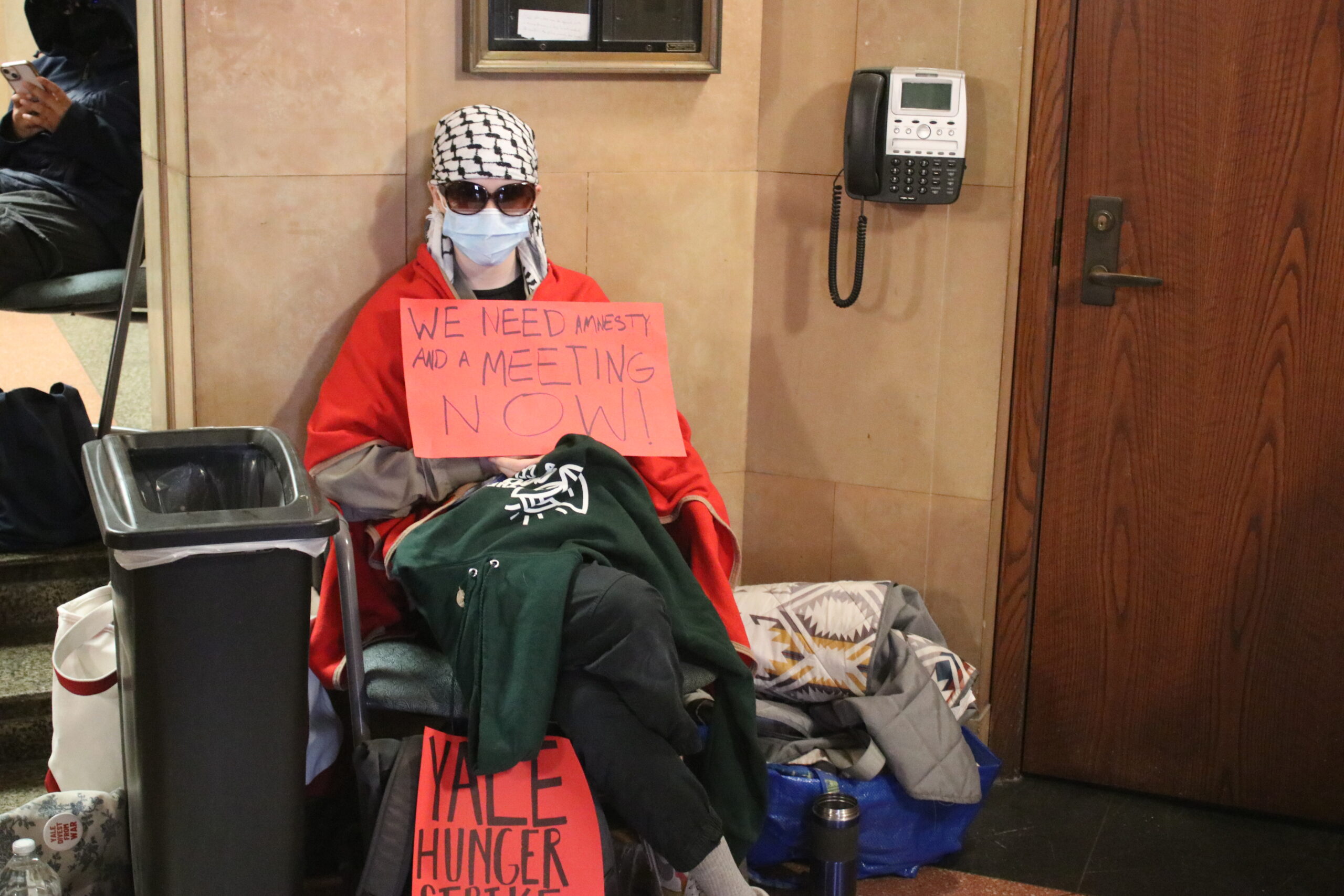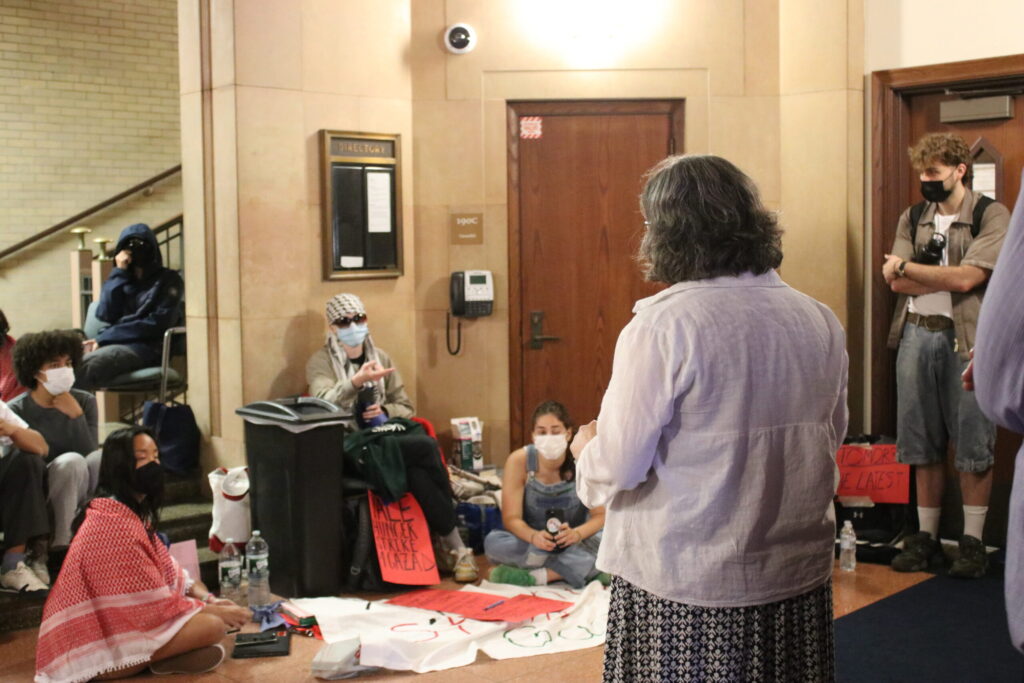Administrators decline to meet with Yalies4Palestine on hunger strike’s fourth day
Hunger strikers and other demonstrators dispersed from a Tuesday gathering after being told that they would otherwise face disciplinary action and potential arrest. Although many hunger strikers have reached low blood sugar levels, they declined medical attention.

Lily Belle Poling, Staff Photographer
On the fourth day of a hunger strike “for Gaza,” a Yale administrator told pro-Palestinian strikers and their student supporters that their demand for a meeting with University leadership would not be met. Protesters were then told to disperse from the lobby of Sheffield-Sterling-Strathcona Hall, or SSS, or risk disciplinary action or arrest.
This past Saturday, five Yale College students and one alum associated with Yalies4Palestine began a hunger strike, announcing their plan to fast indefinitely until the Yale administration meets their demands to divest from weapons companies, adopt an exclusionary human rights investment screening process, end academic partnerships related to Israel and spare student protesters — including themselves — from disciplinary punishment.
When they began their strike, the hunger strikers requested a Monday meeting with University President Maurie McInnis, Yalies4Palestine wrote in a press release. On Tuesday, demonstrators said they wanted an “open” meeting with McInnis and the Yale Corporation’s advisory committee on investor responsibility. Demonstrators spoke to the News on Tuesday on the condition of anonymity due to fear of retaliation from administrators.
Around 4 p.m. on Tuesday, Melanie Boyd, Yale College’s dean of student affairs, told the demonstrators that “the administration does not intend to hold any additional meetings,” besides a September meeting held between a trustee and three pro-Palestinian students.

In a statement to the News on Tuesday night, University spokesperson Karen Peart affirmed that “the university does not intend to hold additional meetings” with Yalies4Palestine.
Until Tuesday afternoon, when Boyd came to SSS to tell demonstrators that administrators would not hold a meeting, the hunger strikers’ only communication with administration was with Earle Lobo, associate director for university life, an administrator who mediates issues at protests and other events.
The strikers first congregated publicly on the steps to SSS, but, on Tuesday, moved inside with about 20 other demonstrators supporting their cause. One demonstrator who was present to support the hunger strikers told the News that the decision to move inside SSS was for the sake of the strikers’ safety, explaining that demonstrators were told they could not sit on chairs outside. She expressed concern that hunger strikers with low blood pressure could faint or have seizures if they were to abruptly stand up after sitting on the ground.
While administrators initially emphasized that participating in a hunger strike does not violate any University policies, Tuesday’s move inside SSS “was in violation of university policy,” the University spokesperson wrote to the News, adding that the policy requires “students who wish to hold an event or gathering on campus to be part of a recognized student organization that requests and is granted permission for use of the space.”
Yalies4Palestine’s status as a registered student group was revoked on April 23 because of the organization’s role in promoting a pro-Palestinian protest on Beinecke Plaza the day prior.
Boyd told the gathered demonstrators to vacate SSS by 4:30 p.m. If they did not comply, they would be asked to show identification, and students who refused could face disciplinary action or arrest, Boyd said. She suggested the protesters continue their demonstration on “public property,” such as the sidewalk or “the Green,” but not on “Yale’s property.”
“I’m here to remind you that you’re not allowed to be here,” Boyd told the demonstrators on Tuesday. “The policy is that you need permission to hold an event or a gathering on campus.”
The group dispersed from the lobby of SSS by 4:16 p.m. and gathered outside the building as they had done in previous days.
An hour before Boyd’s announcement, Yale Public Safety red-lit the doors to SSS so that student and faculty ID cards could no longer gain access. Initially, students inside the building opened the doors for other students who wished to enter, but at 3:15 p.m., Yale Public Safety officers instructed students that the building was closed and blocked the doors. When three Yale faculty members — including a head of college — came to the building to speak with the student protesters, security officers let them enter.
Throughout the strike, Lobo told demonstrators that their signs could not be on the ground, citing the Use of Outdoor Spaces policies, a hunger striker told the News. Subsequently, strikers put their posters and signs on top of their backpacks and other personal belongings in an attempt to circumvent Lobo’s instructions, which one described as seemingly “arbitrary.”
On Tuesday, the hunger strikers repeatedly asked Lobo to schedule a meeting with administrators, to which Lobo responded, “I’m not here to set up a meeting.”
One hunger striker told the News that they will continue to fast “until we get a fucking meeting,” but that “we don’t dream that big,” when it comes to holding out until the administration meets their five demands.
Strikers keep fasting despite health concerns
On Tuesday, before Boyd arrived, Lobo continually asked protestors if they needed medical attention, telling them that he was there to look out for their “well-being.”
Participants in the strike have been checking their blood pressure and blood sugar twice daily, a hunger striker told the News, and sending these vitals to administrators in emails each morning.
On Tuesday morning, one hunger striker’s blood sugar was at 39 milligrams per deciliter. Blood sugar content below 70 milligrams per deciliter falls in the low blood sugar category, and anything below 54 is “cause for immediate action,” according to the National Institute of Health. Other strikers reported instances of feeling unable to move.
Around 2 p.m. Tuesday, a medic arrived at SSS to ask if any hunger strikers needed medical attention. Strikers refused the help, instead saying that they have their own “trusted” medical professionals to examine them.
One hunger striker told the News that Lobo threatened Tuesday morning to “involuntarily commit” or “medically arrest” strikers refusing medical attention
When asked about this claim, the University spokesperson wrote that “university officials inquired about whether students felt they needed medical assistance. None of the participants felt a need for that assistance. Based on that information, no one was offered transport to a medical facility.”
On Tuesday, Yalies4Palestine announced on their Instagram that a “Yale staff member imminently joins hunger strike,” increasing the number of individuals participating in the strike from six to seven. Multiple protestors confirmed this addition, although the News was unable to independently identify the individual and whether they were participating in the fast.
The pro-Palestinian hunger strike at Yale which occurred in April 2024 lasted eight days.
Ariela Lopez contributed reporting.
Correction, May 14: A previous version of this article misidentified Earle Lobo’s position. He is the associate director for university life, not assistant director of student conduct and program manager for student affairs.







